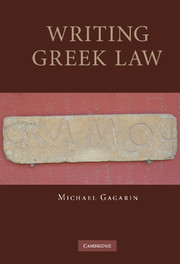Book contents
- Frontmatter
- Contents
- List of illustrations
- Preface and Acknowledgments
- List of abbreviations
- Introduction: Writing Greek Law
- Chapter 1 Law before Writing
- Chapter 2 Writing and Written Laws
- Chapter 3 Why the Greeks Wrote Laws
- Chapter 4 Why Draco Wrote his Homicide Law
- Chapter 5 Oral and Written in Archaic Greek Law
- Chapter 6 Writing Laws in Fifth-Century Gortyn
- Chapter 7 Writing the Gortyn Code
- Chapter 8 Writing Law in Classical Athens
- Chapter 9 Writing Athenian Law: a Comparative Perspective
- Chapter 10 Writing Law in Hellenistic Greece
- Conclusion: Writing Greek Law
- Appendices
- Bibliography
- Index Locorum
- Subject Index
Chapter 8 - Writing Law in Classical Athens
Published online by Cambridge University Press: 22 September 2009
- Frontmatter
- Contents
- List of illustrations
- Preface and Acknowledgments
- List of abbreviations
- Introduction: Writing Greek Law
- Chapter 1 Law before Writing
- Chapter 2 Writing and Written Laws
- Chapter 3 Why the Greeks Wrote Laws
- Chapter 4 Why Draco Wrote his Homicide Law
- Chapter 5 Oral and Written in Archaic Greek Law
- Chapter 6 Writing Laws in Fifth-Century Gortyn
- Chapter 7 Writing the Gortyn Code
- Chapter 8 Writing Law in Classical Athens
- Chapter 9 Writing Athenian Law: a Comparative Perspective
- Chapter 10 Writing Law in Hellenistic Greece
- Conclusion: Writing Greek Law
- Appendices
- Bibliography
- Index Locorum
- Subject Index
Summary
Thus far our study of writing in Greek law has focused largely on the texts of laws, these being practically the only legal texts that were written in the archaic period and fifth-century Gortyn. When we turn to law in classical Athens, however, we find evidence of many more kinds of written documents. Much of the evidence for these comes not from inscriptions but from speeches written for actual trials ca. 420–322. This evidence is in some ways more problematic than a collection of statutes like the Gortyn Code, but the speeches not only provide information about written texts in Athenian law; they also shed light on the actual operation of law in classical Athens, and they inform us about attitudes toward writing and written texts at this time.
Before the fifth century, the only written texts in Athenian law besides the laws themselves were the written indictments in cases prosecuted by means of the graphē procedure (Chapter Five). During the course of the fifth and fourth centuries, however, written texts are increasingly present in judicial procedure. In fact, the amount of writing in general, as well as the number of people who knew how to read and write, increased steadily. We cannot speak of mass literacy, but literacy went “far beyond the circle of the wealthy” (W. Harris 1989: 114). For the fifth century Harris suggests that about 10 percent of the total population was literate, but others would put the figure much higher.
- Type
- Chapter
- Information
- Writing Greek Law , pp. 176 - 205Publisher: Cambridge University PressPrint publication year: 2008



